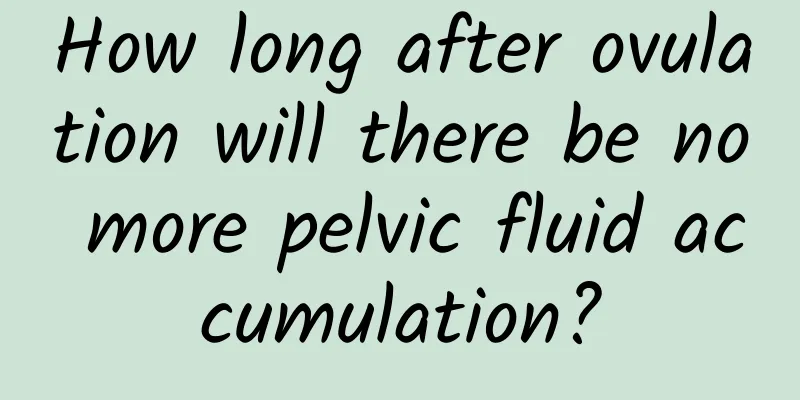How long after ovulation will there be no more pelvic fluid accumulation?

|
Mature women will ovulate, which is a normal phenomenon. However, some women will experience some discomfort after ovulation. So, how long will it take after ovulation for pelvic fluid to accumulate again? Pelvic effusion is the presence of inflammatory exudate in the pelvic cavity. It can occur after the endometrium becomes inflamed. The slightly viscous fluid exudates from the swollen cells of the endometrial tissue and is gradually wrapped by the surrounding tissue to form a cystic mass. Pelvic effusion is a common sign of chronic pelvic inflammatory disease, often caused by the failure to completely treat acute pelvic inflammatory disease, or the poor physical condition of the patient, and the prolonged course of the disease. It belongs to the category of "leucorrhea", "lower abdominal pain", "lower back pain" and so on in traditional Chinese medicine. The normal pelvic effusion value should be less than 10mm, which is also divided into pathological and physiological. Physiological pelvic effusion is generally within this range. After some special periods, part of the fluid will enter the pelvic cavity along the fallopian tube, and women will be prompted during ultrasound. Especially after menstruation and ovulation, the follicular fluid will enter the pelvic cavity, generally forming a small amount of pelvic fluid effusion, which can be clearly seen during scientific examination. Generally speaking, pelvic fluid effusion in this case will not affect the body and will disappear on its own after a period of time. This type of situation does not require treatment, and female friends do not need to worry too much. Not everyone can be diagnosed with pelvic effusion after ovulation. How long it takes for pelvic effusion to disappear after ovulation varies from person to person. The effusion must be more than 1.0 cm to be considered pathological effusion. Generally, physiological effusion can disappear on its own after 3 to 5 days, and there is no need to seek medical attention. However, if you find symptoms of pelvic effusion and the effusion has not disappeared within a week, you should go to the hospital for examination. |
<<: What kind of ring is suitable for patients with adenomyosis
>>: Can I still get pregnant with an ovarian cyst?
Recommend
What to do if there is a lot of pelvic fluid
Treatment of pelvic effusion 1. Physical therapy ...
What complications may result from abortion?
What complications can abortion cause? I believe ...
What are the symptoms of severe cervicitis?
Cervicitis is one of the more common diseases amo...
Double the fat burning effect! Interval training + light fasting
The exercise is short and effective, and has long...
What causes ectopic pregnancy?
What are the causes of ectopic pregnancy? Due to ...
Stay away from the three highs by supplementing deep sea magnesium (Part 1)
Magnesium is one of the essential minerals for th...
Drinking coffee before exercise can help burn fat and lose weight? Nutritionist Liu Yili: Pay attention to 4 key points to avoid sequelae
For office workers, coffee is a must-have drink t...
What medicine should be used for endometrial tuberculosis
Treatment of endometrial tuberculosis is necessar...
What are the symptoms of pelvic inflammatory disease?
When the female internal reproductive organs and ...
What is the best surgical treatment for missed abortion?
Missed abortion is a very painful thing for women...
Why is there redness and swelling below during menstruation?
Why does redness and swelling occur during menstr...
What are the causes of moderate cervical erosion? Moderate cervical erosion is related to these factors
Everyone should be familiar with cervical erosion...
Can I still have children if I have vulvar leukoplakia?
Can you still have children if you have vulvar le...
Can women with cervical erosion eat donkey-hide gelatin? Dietary taboos for women with cervical erosion
Some women will have many gynecological diseases ...
Eat small, frequent and balanced meals during pregnancy to nourish the fetus instead of gaining weight! Nutritionist: 3 tips for diet during pregnancy
Unbalanced nutrition and overnutrition lead to so...









